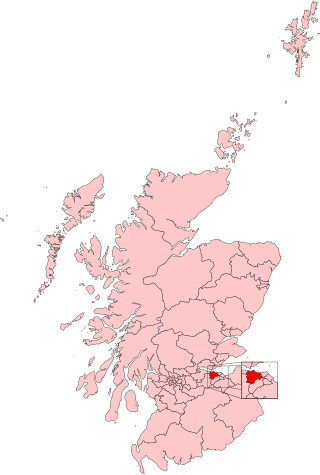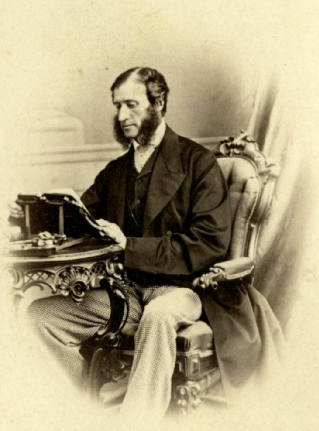
In the United Kingdom under the premiership of William Gladstone, the Representation of the People Act 1884, also known informally as the Third Reform Act, and the Redistribution Act of the following year were laws which further extended the suffrage in the UK after the Derby government's Reform Act 1867. Taken together, these measures extended the same voting qualifications as existed in the towns to the countryside, more than doubling the electorate in the counties, and essentially established the modern one member constituency as the normal pattern for parliamentary representation.
The Combined Scottish Universities was a three-member university constituency of the House of Commons of the Parliament of the United Kingdom from 1918 until 1950. It was created by merging the single-member constituencies of Glasgow and Aberdeen Universities and Edinburgh and St Andrews Universities.

Edinburgh South is a constituency of the House of Commons of the UK Parliament created in 1885. The constituency has been held by Scottish Labour since 1987, being represented by Ian Murray since 2010. Murray was the only Labour MP in Scotland to retain his seat at the 2015 and 2019 general elections and this is one of only three seats never held by the Scottish National Party (SNP).

Edinburgh West is a burgh constituency of the House of Commons of the Parliament of the United Kingdom, first contested at the 1885 general election.

East Renfrewshire is a constituency of the House of Commons, to the south of Glasgow, Scotland. It elects one Member of Parliament (MP) using the first-past-the-post system of voting.

Edinburgh Central was a burgh constituency of the House of Commons of the Parliament of the United Kingdom from 1885 to 2005. It elected one Member of Parliament (MP) by the first past the post system of election.

Glasgow Camlachie was a burgh constituency represented in the House of Commons of the Parliament of the United Kingdom from 1885 until 1955.
Glasgow Govan was a parliamentary constituency in the Govan district of Glasgow. It was represented in the House of Commons of the Parliament of the United Kingdom for 120 years; from 1885 until 2005, returning one Member of Parliament (MP) elected by the first-past-the-post system.
Glasgow St. Rollox was a burgh constituency represented in the House of Commons of the Parliament of the United Kingdom from 1885 until 1950. It elected one Member of Parliament (MP) using the first-past-the-post voting system.

Glasgow Tradeston was a burgh constituency represented in the House of Commons of the Parliament of the United Kingdom from 1885 until 1955. It elected one Member of Parliament (MP) using the first-past-the-post voting system.

West Renfrewshire was a county constituency of the House of Commons of the Parliament of the United Kingdom from 1885 to 1983 and again from 1997 until 2005. In 2005 the constituency was abolished and the area is now represented by Inverclyde, Paisley and Renfrewshire North and Paisley and Renfrewshire South.
Linlithgowshire was a Scottish county constituency of the House of Commons of the Parliament of the United Kingdom from 1708 to 1950. It elected one Member of Parliament (MP) by the first past the post voting system. It was replaced in 1950 by an equivalent constituency named West Lothian.

The Redistribution of Seats Act 1885 was an Act of the Parliament of the United Kingdom. It was a piece of electoral reform legislation that redistributed the seats in the House of Commons, introducing the concept of equally populated constituencies, a concept in the broader global context termed equal apportionment, in an attempt to equalise representation across the UK. It was associated with, but not part of, the Representation of the People Act 1884.
NorthLanarkshire was a county constituency of the House of Commons of the Parliament of the United Kingdom (Westminster) from 1868 to 1885 and from 1918 to 1983. It elected one Member of Parliament (MP) by the first past the post voting system.

George Dundas was a Scottish Tory politician and colonial administrator.

The Elections Act 1885 was an Act of the Parliament of the United Kingdom. It became law on 28 April 1885.

The Medical Relief Disqualification Removal Act 1885 was an Act of the Parliament of the United Kingdom. It became law on 6 August 1885.

The Telegraph Act 1885 was an Act of the Parliament of the United Kingdom. It became law on 14 August 1885.
Kirkcaldy Burghs was a burgh constituency of the House of Commons of the Parliament of the United Kingdom (Westminster) from 1832 to 1974. It elected one Member of Parliament (MP) by the first-past-the-post voting system. From 1832 to 1950 it was, officially, a district of burghs constituency.

Colonel Sir Edward Stock Hill was a British shipowner and Conservative Party politician in the United Kingdom who served as Member of Parliament (MP) for Bristol South from 1886 to 1900.











